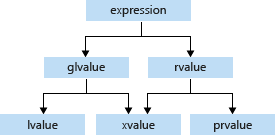The following diagram illustrates the relationships between the categories:

The C++17 standard defines expression value categories as follows:
- A glvalue(generalized lvalue) is an expression whose evaluation determines the identity of an object, bit-field, or function.
- A prvalue(pure rvalue) is an expression whose evaluation initializes an object or a bit-field, or computes the value of the operand of an operator, as specified by the context in which it appears.
- An xvalue(eXpiring value) is a glvalue that denotes an object or bit-field whose resources can be reused (usually because it is near the end of its lifetime). Example: Certain kinds of expressions involving rvalue references (8.3.2) yield xvalues, such as a call to a function whose return type is an rvalue reference or a cast to an rvalue reference type.
- An lvalue is a glvalue that is not an xvalue.
- An rvalue is a prvalue or an xvalue.
The following code demonstrates several correct and incorrect usages of lvalues and rvalues.
// lvalues_and_rvalues2.cpp
int main()
{
int i, j, *p;
// Correct usage: the variable i is an lvalue and the literal 7 is a prvalue.
i = 7;
// Incorrect usage: The left operand must be an lvalue (C2106).`j * 4` is a prvalue.
7 = i; // C2106
j * 4 = 7; // C2106
// Correct usage: the dereferenced pointer is an lvalue.
*p = i;
// Correct usage: the conditional operator returns an lvalue.
((i < 3) ? i : j) = 7;
// Incorrect usage: the constant ci is a non-modifiable lvalue (C3892).
const int ci = 7;
ci = 9; // C3892
}